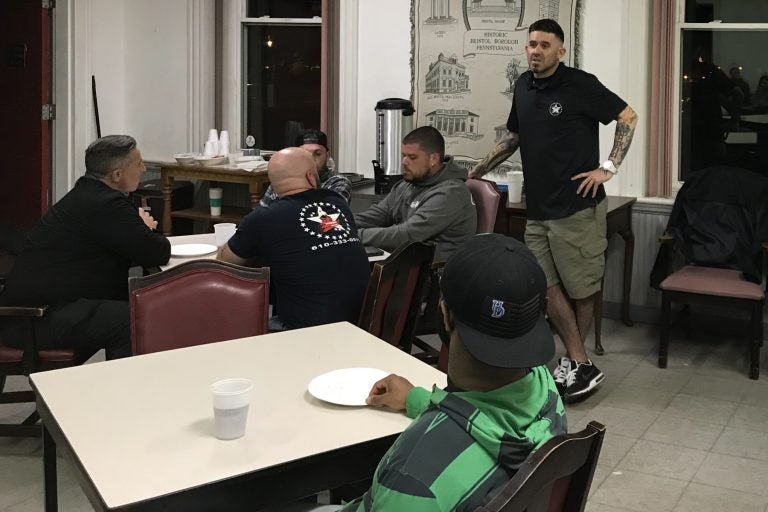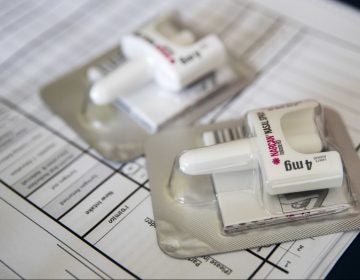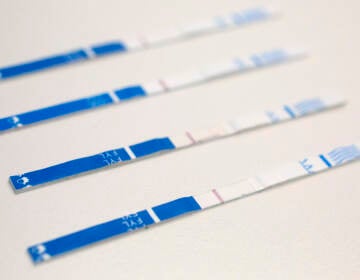Bucks recovery houses striving to be better neighbors
At community outreach in Bristol Township, recovery home residents invite residents to hear how the homes work — and how important they are to those fighting addictions.
Listen 2:14
Bryan Kennedy of Independence Lodge recovery house talks at a community outreach event in Bristol Monday night. (Joel Wolfram/for WHYY)
A few dozen people settled into seats in the cafeteria of a senior center in Bristol Township Monday night, helping themselves to a buffet of soda, pizza, and doughnuts. Most were current or former residents of the area’s growing number of recovery houses who came to answer questions about how the homes work.
As the discussion got going, recovery house operator Scott Fleming acknowledged the negative perceptions some have of the residences for sober living.
“This isn’t just some home you buy and you throw people in and collect rent,” Fleming said. “I know that goes on, but that’s not what we are.”
Only a few people from the community showed up to the question-and-answer session, but recovery house residents were still eager to discuss how sharing a home with others in recovery had helped them.
Abby Kirschner, 28, said her time in one of the homes helped her learn to face life’s responsibilities without drugs or alcohol.
“You have a safe place to go,” Kirschner said. “So you go to these houses, and you learn how to live again. It’s stuff that they don’t teach you in treatment, like how to get a job, how to do your chores, how to do all these things that, maybe when you’re using or drinking, it doesn’t seem like are important things to do.”
The Monday event was an opportunity for recovery houses in Bucks County to improve their image and relations with the community. They belong to the Bucks County Recovery House Association, a self-governing body that sets standards for the residences. Recovery houses have proliferated rapidly in Bristol Township in recent years, causing tension with residents. As of 2016, an estimated 100 were operating in the township, with more believed to be flying under the radar of authorities.
Recovery houses can provide a supportive situation for many people coming out of addiction treatment. Residents pay rent, attend support group meetings, and follow curfews and other house rules to keep them accountable to a sober lifestyle. But the homes are mostly unregulated, and some in the Philadelphia region have taken advantage of their vulnerable residents. Allegations have included overcrowding houses, stealing welfare benefits, getting kickbacks for referring residents to certain treatment providers, and other schemes to exploit people in recovery for profit.
The houses have little government oversight, leaving regulation to private entities such as the Bucks County group and other associations at the state and national level. The Bucks County Recovery House Association counts 72 recovery houses among its members, said chairman Don Colamesta.
Pennsylvania passed a law in December to set standards for recovery homes that opt into a new certification program. But as with the Bucks association, participation is voluntary.
Still, Kirschner said these efforts help weed out the bad apples.
“People are taking advantage of people in their vulnerable early recovery stages,” she said. “Without a governing body, you don’t know what you’re going to get.”
Kirschner said it was especially important to ensure houses were taking good care of their residents in midst of the current opioid crisis, with so many at risk of dying when they relapse.
People from several recovery houses who attended Monday night’s meeting said their homes had begun stocking the overdose-reversal drug naloxone and requiring residents to be trained in how to use it.
WHYY is your source for fact-based, in-depth journalism and information. As a nonprofit organization, we rely on financial support from readers like you. Please give today.





